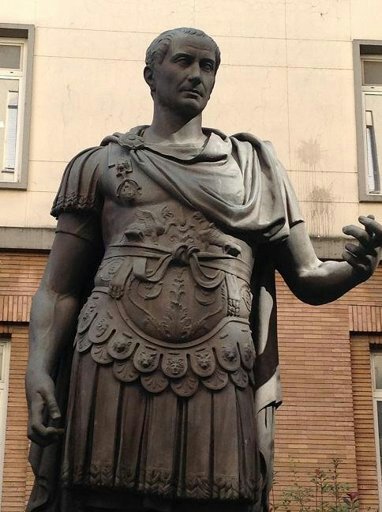
Caesar often spoke of himself only as Caius Caesar, omitting the nomen gentile Iulius. A longer version can also be found, however rarely: Gaius Iulius Gai(i) filius Gai(i) nepos Caesar ("Gaius Julius Caesar, son of Gaius, grandson of Gaius"). The name of the dictator Julius Caesar-Latin script: CAIVS IVLIVS CAESAR-was often extended by the official filiation Gai filius ("son of Gaius"), rendered as Gaius Iulius Gai filius Caesar. Caesar's grand-nephew, Gaius Octavius Thurinus, duly took the full name "Gaius Julius Caesar" upon Caesar's posthumous adoption of him in 44 BC (while legally he should have been "Gaius Julius Caesar Octavianus", and was/is called as such by contemporaries and historians, he himself never used either of his original surnames again), and the name of Caesar became fused with the imperial dignity after Octavianus became the first Roman Emperor, Augustus in this sense it is preserved in the German and Bulgarian words Kaiser and Tsar (sometimes spelled Czar), both of which refer to an emperor.Ĭompare the Hungarian, Slavic and Turkish words for "king", forms of kral, all adapted from Karl, the personal name of Charlemagne. Though contemporary writers sometimes referred to him as "Gaius Caesar," the name's historical usage was not the same as it is in the 21st century.

In modern English usage, his full name might be something like "Gaius Caesar of the Juliuses", where 'Caesar' denoted him as a member of the 'Caesarian' family branch of the 'Julius' clan or gens Julia in proper Latin, and 'Gaius' was his personal name. Gaius, Iulius, and Caesar are Caesar's praenomen, nomen, and cognomen, respectively. Roman nomenclature is somewhat different from the modern English form. In Greek, during Caesar's time, his name was written Καῖσαρ, which was pronounced more or less the same.

(The letterform Æ is a ligature, which is often encountered in Latin inscriptions, where it was used to save space, and is nothing more than the letters "ae".) The leading vowels in each part of the name are long, and in Classical Latin, the whole name was pronounced, or, alternatively, with praenomen pronounced trisyllabically as. (That is, the s between vowels did not change to r.) Using the Latin alphabet as it existed in the day of Julius Caesar (100 BC – 44 BC) (i.e., without lower case letters, "J", or "U"), Caesar's name is properly rendered GAIVS IVLIVS CAESAR (the spelling CAIVS is also attested and is interchangeable with the more common GAIVS however the letter C was used with its antique pronunciation of, as it was an adaptation of Greek gamma). The name Caesar probably originated in Italy from a dialect of Latium which did not share the rhotacism of the Roman dialect.


 0 kommentar(er)
0 kommentar(er)
